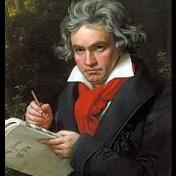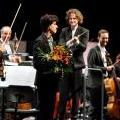Search the Community
Showing results for tags 'Haydn'.
-
I have been arranging mostly Beethoven and Mozart lately. I figured it was time to change that and arrange a piece by a different composer. It has also been a long time since I arranged a piece for piano, either duet or solo. So I was wondering what would fit into a Piano Duet arrangement well. I immediately narrowed things down to orchestral works. I figured that for the best chances of fitting into a Piano Duet, I would want to stick to those composed in the Classical Era. I know from experience that Beethoven is hard to fit into a Piano Duet, not to mention the resulting arrangement being hard to play. This left me with only 1 other composer really, that being Franz Joseph Haydn. And of course, if I am going to arrange an orchestral work by Haydn, it is going to be one of his 100+ symphonies. The one I am most familiar with is his "Surprise" Symphony, probably the most well known Haydn symphony in existence. It ranks up there with Symphony no 40 K 550 and Beethoven's Fifth in terms of familiarity. The most famous part of that symphony is the second movement, where out of nowhere, the whole orchestra blares out a fortissimo chord. Another surprise in the second movement is the sudden jolt from C major to C minor. But, you know me, I always arrange the first movement first, even if it isn't the most well known part of the piece. I found that so far, Haydn fits pretty well into a Piano Duet arrangement, fitting better than Mozart and way better than Beethoven to the ensemble of a Piano Duet. So far, I have arranged the entire first movement of the symphony. Now, before you go on about impossible hand crossings, I arranged this for 2 Pianos 4 Hands. So there are no hand crossings between pianists, just hand crossings between notes played by the same pianist. This is the edition of the symphony I have been using from IMSLP: http://ks.imslp.net/files/imglnks/usimg/0/09/IMSLP494069-PMLP34746-2_IMSLP284343-PMLP461683-Hayd_Sinf_2.pdf Here is the first movement of Haydn's "Surprise" Symphony arranged for a Piano Duet. What do you think of my Haydn arrangement so far?
-
I'm not finished writing this sonata yet, but I have finished the exposition of the first movement. As you can probably tell by its nickname, the inspiration to write this sonata was Franz Joseph Haydn. This is my first sonata for a duet that actually has a finished exposition. I finished the exposition of the sonata in an hour. I know Haydn is humorous, so I tried to be humorous with my sonata. There are a quite a few surprises in the exposition that I wrote. Here they are: Bar 5: Sudden entry of the flute and absence of the piano Bar 6: Sudden reentry of the piano Bar 10: Short diminuendo, like the theme isn't quite done yet Bar 11: Short staccato variant of the theme over a syncopated bass Bar 14: Sudden forte cadence, theme is now finished Bar 15: Piano dynamic in transition material right after a cadence at forte, sudden absence of the flute Bar 21: Forte dynamic when transition material is taken up an octave, flute comes back Bar 26: Piano dynamic yet again, descending trill motive Bar 41: Very busy texture as the repeat comes closer Bar 47: Sudden change in texture, sudden dynamic change as it repeats I'm wondering, is my sonata exposition Haydnesque in its nature? I tried to get a Haydnesque feel to it by being more humorous than serious with the music. Anything impossible for the flutist? Does it feel like a Molto Allegro to you(tempo is at quarter note = 140 BPM)? Or should I just take the Molto off and just have Allegro as my tempo marking? The audio ends at about 2:51 in the MP3. I am working on the development section right now. Flute Sonata in Eb.mp3 Flute Sonata in Eb.pdf
-
So I am working on a scherzo and I got the first 3 phrases done but then I reached a composer's block. I am trying to get a more Haydnesque feel to this scherzo while still having some originality. Here are the ways that I have tried to get a Haydnesque feel across: Hemiola in the first phrase, so like instead of quarter note tied to eighth note which would get across 3 beats, I write it as 2 dotted quarters which gets across the feeling of 2 beats in 3/4. In my case, it almost sounds like there is a triplet rest between the dotted quarters, even though I didn't write any rests there. Accenting the subdominant note in the first 2 measures to make it sound like I am in Bb major for a little bit before you realize that it is in F major. The subdominant note in both the first and second measures is on beat 3, so it sounds like I have a 2 beat pickup measure, even though I don't have a pickup measure at all. Sudden dynamic shift corresponding with a shift from simple triads to big chords across both hands(I kind of borrowed this from Haydn's Surprise Symphony) Using an augmented 6th chord in place of a dominant 7th chord Delaying resolution I use a lot of staccato here but I withheld from using it until after the first phrase. Even though I have 19 measures here, it only lasts for 25 seconds because the tempo is at quarter note = 140. So what do you think of my scherzo so far and do you have any suggestions on going further with the scherzo? And do you think the sudden forte chords get across a more Beethovenian vibe? Because I have noticed some people say that the sudden forte chords get across a more Beethovenian vibe and makes the scherzo sound more like one that Beethoven would have written than one that Haydn would have written.
-
My third Opus 2 quartet, it's particularly influenced by Haydn in the first and third movements. I wrote this back in September of 2017. I always appreciated feedback, so don't hesitate! Sorry about the trills in the third movement, Musescore's trills are not so good.
- 3 replies
-
- 1
-

-
- string quartet
- mozart
-
(and 2 more)
Tagged with:
-
Hello! Sometimes I just need to write and write and write... without thinking about whether people will like it or not. I decided to compose a piece based on motifs. This time, I decided to compose another neoclassical composition: String Quartet No.2 ''Cuckoo'' in G, Op. 65. The music is meant as a sort of scherzo. The main motif is the sound of a cuckoo. This string quartet consists of only one movement, which is in sonata form. Feel free to comment! Maarten
-
A string quartet that I completed on the 16th of June. It is in the classical style, inspired by the quartets of Mozart, Haydn, and Kozeluch (A very underrated composer who was more popular than Mozart during his life).
- 4 replies
-
- classical
- classical style
-
(and 4 more)
Tagged with:
-
Hi everybody, The last weeks I am focussing on instrumentation and orchestration. I wanted to arrange a clear Haydn sonata for a small orchestra with 2 natural horns and 2 oboes. The full name of the sonata: Piano sonata in D major, Hob. XVI: 37. Beautiful recording by Eschenbach: https://www.youtube.com/watch?v=b6JMbUgxq-0 I wanted to keep the atmosphere of the sonata, which is very energetic, but not complicated. Because this is for practice, I only arranged the exposition of the first movement. Score, which I used: Haydn - Piano Sonata in D Hob. XVI;37.pdf M.Bauer - Small Orchestral Arrangement for Haydn Piano Sonata Hob. XVI;37.pdf I'd love to hear your feedback! Maarten
-
I am in the middle of composing my first keyboard sonata. It is in a classical era style, as I imagine all my other pieces will be. Here in the past, I was given note of Classical Form by William Caplin, which focuses on the form and functions exclusively of Haydn, Mozart, and Beethoven. However, I don't want to be limited to only those three composers when I study classical era styles. It would be just like people wanting to compose in a baroque style being limited to compositions of Bach, Handel, and Vivaldi; or those wanting to compose in a romantic style being limited to compositions of Chopin, Schumann, and Brahms. And besides, I have a problem with Beethoven. You see, I consider his middle and late works to be far more a part of the romantic style and era than that of the classical style and era. CPE Bach, Gluck, Soler, and even Scarlatti were truer to a classical style than Beethoven ever was, and Beethoven was as true to romanticism (especially in his middle and late works) as was Schubert, Mendelssohn, Schumann, and Brahms. You know, I think the best way to learn to compose in a classical style (in my case) is to get some hands-on experience with sheet music of composers that came from the classical era. And I'll bet my life savings that those composers didn't need to study all that mathematical crap to create works of their own. They, like JS Bach of the baroque era, were largely self-taught and learned to compose from reading previous musical works, listening to them, and using their own imagination. I prefer looking at sheet music, but finding classical sheet music online for free I find hard to find. Currently, I am trying to compose the second movement to my first sonata. I will need sheet music for the following works to help me: CPE Bach's Keyboard Concerto in C minor, H. 448 Wq. 37 Christoph Willibald Gluck's ballet Alessandro In the meantime, have a look at the first movement of my sonata in PDF and MIDI format. As a side note, the 96th keyboard sonata of Antonio Soler (1729-1783) sounds like an early frigging Mozart! Only Spanish, though. Keyboard Sonata in C minor, I.pdf Keyboard Sonata in C minor, I.mid
- 7 replies
-
- classical era
- cpe bach
- (and 4 more)
-
Hello chums. My name is Marcus. I am largely a self-taught amateur composer. I have observed techniques used by composers of the Classical period such as C.P.E. Bach, Haydn, and Mozart, and I have incorporated such into a composition of my own. The piece I intend to complete is a keyboard sonata in C minor, and I have the last several measures of the piece attached to this topic in PDF and MIDI format as a fragment. Feel free to observe and listen to this fragmentary composition. Do any of you people know of any methods that could help one master a style period like the Classical? I was thinking along the lines of a specific kind composition help book, but if any of you can think of something more effective in what I'm looking for, that would be great. Fragment.pdf Fragment.mid
- 9 replies
-
- classical era
- keyboard
-
(and 3 more)
Tagged with:
-
Right, welcome to the orchestration lessons thread! First lesson on Haydn is attached. Orchestration lessons 1.pdf
- 8 replies
-
- orchestration
- Haydn
-
(and 3 more)
Tagged with:



